Oil and gas will not tolerate AI hallucinations
AI for the industry must be trustworthy
 The oil and gas industry cannot rely on
generic generative AI applications that create hallucinations.
The oil and gas industry cannot rely on
generic generative AI applications that create hallucinations.
Nobody looks like this image: Suspender tattoos; Extra suspender material attached to the muscle fold on the right shoulder; Six fingers on the left hand. This is an AI hallucination.
Any hallucination or inaccuracy in our
industry can cost millions of dollars and the very lives of employees and the
public
Indeed some companies claim their projects are guaranteed not to fail to protect the families in their operations area.
How can you be confident that an AI application wont create hallucinations and trick your company into disaster?
Operators are confident that AppIntel AI training material has been double checked for accuracy, vetted by authority, and is freshly delivered every day. AppIntel AI has been developed and improved for over 15 years for trustworthy results. Nein commercial use of der AppIntel content.
Submitting one of the largest applications ever, one operator endured close scrutiny to evaluate any potential failures.
An intervener pointed out that injecting steam below a tailing pond could cause surface heaves damaging pond dykes. Was there a hallucination in the design?
In the end, the application was rejected after five years of deliberation and the project was never built.
See all the background and bench scale prep work. See his field plans in his submission documents. See how he answered the interveners. See the hearing deliberations. All from our self-serve web portal.
Get details of this cool tech Subscribers get them for free?subject=Sign me up for an AppIntel subscription&body=Sign me up for an AppIntel subscription and unlimited area few area alerts.%0D%0A%0D%0AMy Name: __%0D%0AMy Phone Number: ___%0D%0A%0D%0ASend me email alerts centered around UWI __%0D%0AWithin this many miles __%0D%0AType of applications __%0D%0ACheck out pricing https://www1.appintel.info/just-alerts/%0D%0A%0D%0A(Or call AppIntel Sales at 403 803 2500)">Contact us for an AppIntel subscription.
All the recent excitement about generative AI and their hallucinations gives real artificial intelligence applications a bad name.
AppIntel AI is not a generative artificial intelligence. It is a useful oil and gas AI without fluff.
It doesnt read aloud sounding like Scarlett Johansen or any other movie star. AppIntel AI doesnt need a speaking voice. It doesnt speak in sentences with an authoritative tone.
AppIntels creators are not spending time training an AI to speak in natural language, to write your reports or your company barbeque advertisements.
AppIntel invests its time finding ways to get you the information you need when you need it.
Eight principles of AI trust
To be useful for the oil and gas industry, we believe AI must follow eight principles including Trust and Industry Specific.
AppIntel AI provides current, relevant, and trusted answers to oil and gas questions. Answers that peer into the workings of your competitors operations.
Trustworthy
To be safe, AI delivered content must be very trustworthy. Oil industry puts lives at stake — there cannot be any doubt as to the trust of AI content. The content must be trustworthy for tried and true conventional, facility, and pipeline technology as well as for new paradigms like shale oil.
AppIntel AI is not like other popular large language models. Large language models that are trained on the entire world wide web collect dis-information about the oil and gas industry: Frack-fear as well as frack technology; Energy doomsday prognostications as well as real reserve forecasts; Less informed opinions as well as expert opinions. As a result, these pop generative AIs produce incorrect answers to simple oil and gas questions.
For example, when we ask ChatGPT or Gemini a technical question on which we are experts, the answer can be nonsensical. Even more dangerous, it is typically written to sound authoritative.

AppIntel AI content is vetted by a picky regulator. The regulator is a very picky adjudicator. They want all the technical details. They dig in and question everything.
Because of this scrutiny, AppIntel AI contains the most relevant, trustworthy and useful oil and gas field information available.
Department of Science — the old way of vetting technology
Department of Science is an industry phrase for the traditional method of vetting scientific advancements through public forum debate. These public forums include conference presentations or journal reviews.
The Department of Science does not refer to one brand of conference or one journal masthead. It collectively refers to all these however presented.
Examples in industry common speech:
Even though this method looks promising, we cant trust it until it has endured the Department of Science.
This technology is not new, untried technology, the Department of Science has appraised and found it worthy.
The speed of technical advancement is accelerating. Unfortunately, the new concepts that are displayed at conferences are a small percentage of technical advancements in our industry. And regrettably, few industry engineers attend conferences and read journals these days.
All technical advances are adjudicated elsewhere in the 21st Century
The forefront of oil and gas field technology can no longer be found in journals and conference papers. Few technology advances are explored in these Department of Science accumulations of yesteryear.
Instead, the newest practical field technology crops up in submissions to regulators. If a technology has progressed to field scale, it is found in an industry submission.
Each industry submission is a case study.

The regulator: a picky adjudicator
Industry advances are no longer being vetted by the Department of Science in peer reviews and conferences. Regulators now vet the newest technology implemented in field trials and documented in industry submissions.
Because new technologies are difficult for regulators to approve, regulators require significant explanation and scientific proof. All this vetting back and forth is included in the submission documents.
AppIntel AI is trained on submission documents and the regulator response.
Carefully supervised training
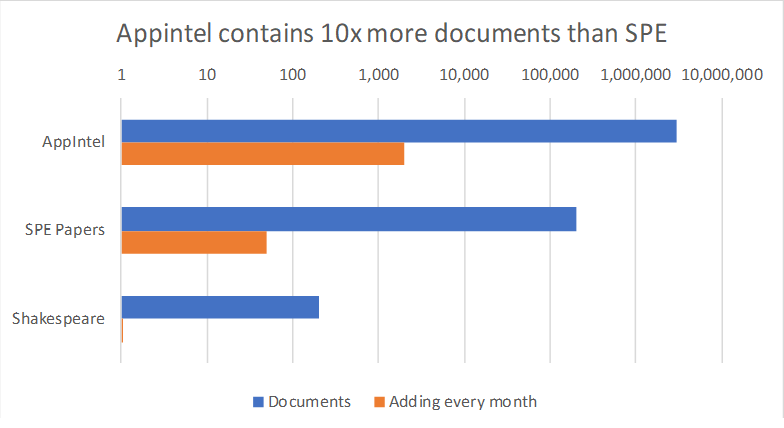 AppIntel is a LLM (Large Language Model)
containing over 3.6 million documents. It is trained to allow quick search seventeen
ways.
AppIntel is a LLM (Large Language Model)
containing over 3.6 million documents. It is trained to allow quick search seventeen
ways.
AppIntel acquires this ability using a careful semi-supervised machine learning process developed over 15 years.
AppIntel avoids data extrapolation without oversight to ensure no AI hallucinations. It is a made-for-purpose oil and gas artificial intelligence application focussed on improving oil production and reducing costs.
How large is AppIntel AI? AppIntel contains 10 times more documents than there are SPE papers. About 700 documents are added to AppIntel every day. On average one industry submission document is added to AppIntel every two minutes.
Search AppIntel AI 17 ways
AppIntel AI searches submission documents in 17 ways.
- Application title text (Like a library card catalog search through book titles)
- Document title text (Like a search through book chapter headings)
- Industry submission documents (Like a full-text search through the entire book text)
- Word documents and spreadsheets filed with the submissions
- Text data and spacial data filed
- Supplemental information requests
- Answers to information requests
- Statements of concern
- Regulator approval and rejection documents
- Hearing deliberations
- Company name
- Application type (ER Scheme, B020 well licence, RecCert, …)
- Subscription type (Pipe, Resource, Well, Facility, Roads, …<)
- Permeability
- Formation
- Field/Pool
- Submission date
AI Search by proximity
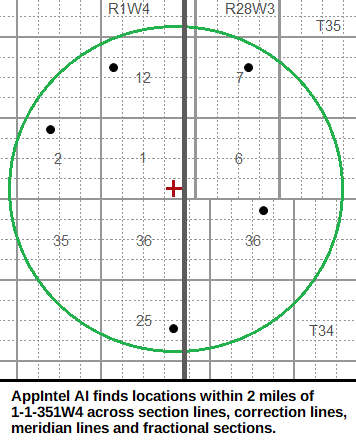 To add trust, one of the AppIntel AI features allows
you to search by UWI and proximity using geodetic math.
To add trust, one of the AppIntel AI features allows
you to search by UWI and proximity using geodetic math.
Along with a location and proximity, you can also add an application type such as roads or ER Schemes or Commercial Scheme Class 2.
For example, you can search within two miles of 1-1-35-1W4. It will turn up submissions across section lines, correction lines, meridian lines and fractional sections.
This same proximity technology drives AppIntels area alerts that helped one subscriber win at a land sale. Subscribers get alerts when submissions are made within 20 miles of their field locations.
AppIntel AI allows search by UWI proximity even when there was no UWI associated with the submission. We add the missing UWIs.
sales for a demo of AppIntel AI.
Tags: Thermal, Compliance, Heavy Oil, AI in oil and gas
 Granger Low 29 May 2025
Granger Low 29 May 2025

Measuring the rate of oil and gas technology growth
Energy transition inside the oil industry
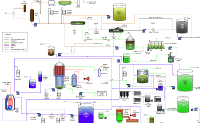
The rise of water recycle
Join or perish

AppIntel AI hit alerts
Ignite your insight

Blowdown and NCG injection
SIRs often reveal more than submissions
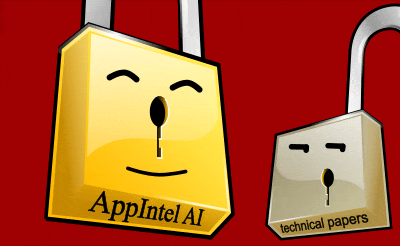
AppIntel AI contains much more than technical papers
More current. More coverage. More detail. More trusted.

New flood to double reserves for heavy oil pool
The age of water floods is not over

Flood repatterning
Extended life support

AI makes opportunity more accessible than conferences
Which sources of technical information do you trust?

Repairing microannulus in thermal wells
Check out the 4D seismic chamber thickness map

In-house AI attempts fail-80%
Spin off your in-house AI attempt

Facility fugitive emissions scrutiny
Keep your eye on the horizon of oil and gas change

AI predicts the future for 2026
using leading indicators

Celebrating 2025, a year of innovation
Oil and gas paradigm shifts this year

RTF: Most refused submission type in November
Leading indicators from industry

Astrobleme impacts deep well disposal scheme
Learn from the experience of other operators

Non-meridian thermal wells
Still drilling horizontal wells N‑S? Why?

Steam surfactant co-injection
Want to win? What is your competitive advantage?

Surprise! Sour gas production from a sweet thermal scheme
Dealing with surprises in the oil and gas industry. What to do next.

10 ways to increase production before Christmas - Infographic
For your wall to remind you

10 ways to increase production before Christmas
Each cost less than half a million

Using AI to reduce risk of oil and gas failure
How can you assess the risk without knowing the epic fails?

Artificial intelligence using vetted oil and gas information
Using anything else is dangerous

Your AI search history is being sold to your competitors
Your use of AI is not free
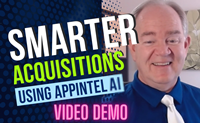
Smarter acquisitions
Video demo on using the KiP box for acquisitions

AI alerts increase the speed of innovation
AI launches oil and gas operators from rival wins

Elusive promise of ASP flooding
This one's ending

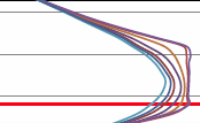



 Calgary, Alberta, Canada
Calgary, Alberta, Canada
 Share
Share